Malcolm Pein: chess impresario
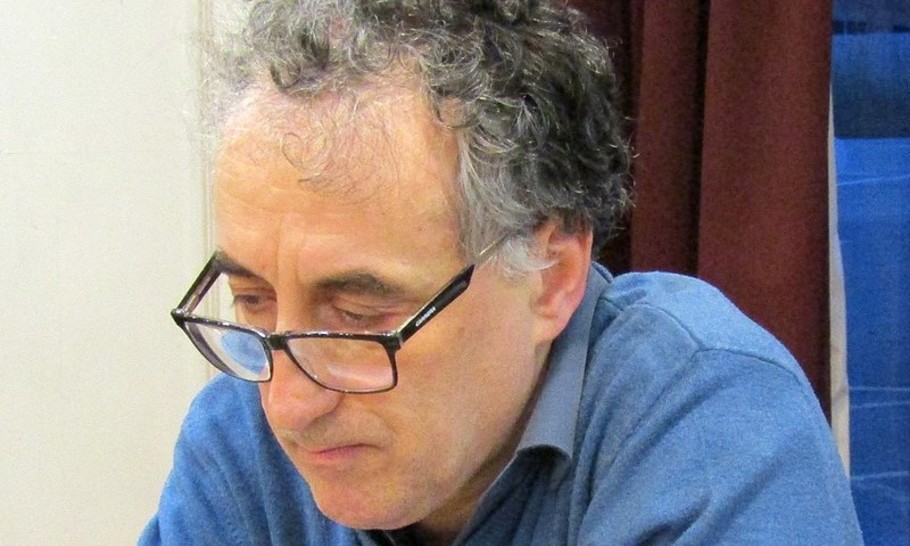
Malcolm Pein, chess player from England, 2017
The indefatigable Malcolm Pein has pulled off a remarkable organisational feat in arranging at short notice for the world rapid and blitz team championships to be staged in London. In fact the venue was the Novotel in Hammersmith, scene of a great Tony Miles tournament triumph in 1975, and my choice for the second Mind Sports Olympiad, which I organised with my friend and colleague, the late Tony Buzan in 1998.
The challenges facing Malcolm are best described in his own words from his Editorial in the July 2025 issue of the magazine Chess:
“It was only in March that I received a request from FIDÉ to organise the World Rapid and Blitz Teams Championships (WRBT) in London for Mid-June. It seemed like a ridiculously short amount of time to find a venue for starters, never mind visas and everything else. Fortunately, I soon learned that tasks at such events are split between the LOC (Local Organizing Committee), and the FIDÉ organizing team, who are experienced and highly professional, if almost exclusively Russian.
By a stroke of luck, the Novotel Hotel in Hammersmith was available and although it did not have the wow factor the FIDÉ President wanted, it had the space and the convenience, and what I thought would be a nice bar area where players could gather between rounds.”
[Footnote: Duchamp is reputed to have said, “There is no progress, change is all we know”. And so it is for the Novotel Hotel in Hammersmith. In 1975, it hosted an enormously important event for British players, the London International. A category VIII round robin tournament was held between 17-28 August. The field was composed of four GMs, Andras Adorjan, Jan Timman, Gyula Sax, and Gudmundur Sigurjonsson, invited to compete with some of the best and most promising IMs and FMs of Great Britain: Anthony Miles, John Nunn, Jeff Horner, Maxwell Fuller, Michael Basman, Craig Pritchett, and Simon Webb. Miles won the event, scoring 3 points against four of the visiting GMs. The following year he would become England’s first ever grandmaster.]
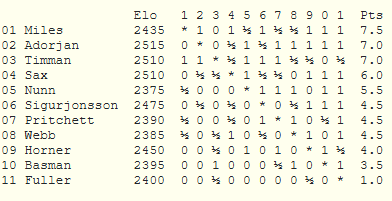
Pein continues: “It took some time to convince the top brass that it was this or nothing, but once that hurdle was overcome, the tournament was born. The WRBT is an unusual beast, although it has a huge prize fund: $500,000. It’s designed to be inclusive and in certain respects not as serious as other FIDÉ events. For one thing, there are no qualifying criteria. Anybody can enter and call their teams whatever they like, which I did. The teams can just be a bunch of friends, a real club, or something more akin to a national side.
The real randomizing factor is the rule which insists on the inclusion of a player who must never have had a rating above 2000, in either Blitz, Rapid or Classical chess. There must also be a female player in each team. Matches are over six boards, so the relative strength of the amateur and the female player can be of huge importance.”
A commonly voiced complaint was the difficulty of obtaining visas for players from friendly countries. It seems to me that the Grandmasters adversely affected would have done better to take an illegal dinghy from Calais, and thus been guaranteed a welcome on English shores with open arms.
Notwithstanding Malcolm’s diplomacy regarding the facilitation of the essential matter of free movement of players, the visa problem had a real significance for the two-time FIDÉ World Championship finalist, Ian Nepomniachtchi. He had to miss the rapid tournament because his visa did not arrive on time, despite an express application with enough time before the tournament.
According to the British Chess Magazine (whose editor, Milan Dinic, served as the Press Officer):
“The same issue occurred for the Global Chess League in October 2024. Given that many of the world’s top players and sponsors come from countries which require visas, it would be helpful if there is more support and understanding in UK authorities. After all – these people want to come to the UK legally, using their own funds and spending them here, and – also – they are helping the struggling UK chess scene get more traction in the world.”
We hope that someone will take note. Maybe even Rachel Reeves (who used to play chess) can see some economic value in making it easier for chess folk to visit Britain. After all, they also bring and spend money here (which we desperately need, given how strained the UK public finances are).
I am obliged to the ever-present and always industrious Mark Crowther for supplying the details of the results in his indispensable TWIC webzine, The Week In Chess.
“Sixth seeds Team MGD1 (Erigaisi, Harikrishna, Anton Guijarro, Pranav, Mendonca, Tsolakidou and Atharvaa P Tayade) won the rapid ahead of Hexamind (Aronian, Giri, Murzin, Domginguez, Vidit, Divya, Panarin and Muradyan) and Freedom (Anand, Mamedov, Sevian, Le, Sarana, Martirosyan, Muzychuk, Injac and Mani) with top seeds WR Chess (Firouzja, MVL, Nakamura, Duda, So, Hou Yifan, Kosteniuk and Rosenstein. Nepomniachtchi couldn’t get a visa in time for the rapid but appeared for the blitz) finishing 5th.
In the blitz WR Chess Team won beating Kazchess (Grischuk, Rapport, Esipenko, Maghsoodloo, Sadvakasov, Ansat, Kamalidenova, Kaliakhmet, Aiten) in the final. Hexamind finished 3rd beating Uzbekistan (Abdusattorov, Sindarov, Yakubboev, Kasimdzhanov, Vokhidov, Khamdamova, Tokhirjonova and Imomkuzieva) in a playoff.
There was controversy in the blitz quarterfinals when Team Germany and Friends beat WR Chess 4-2 with Nepomniachtchi, Nakamura, and Firouzja all losing. Most of the WR Chess team were late to the board and they blamed confusion over the start time, after a lengthy appeal the result was annulled and WR Chess went on to easy wins the second time around.”
Arjun Erigaisi vs. Viswanathan Anand
World Rapid Team Championships, London, 2025
- d4 Nf6 2. c4 e6 3. Nf3 d5 4. e3 Be7 5. b3 O-O 6. Bd3 c5 7. O-O Nc6 8. Bb2 cxd4 9. exd4 Nb4 10. Be2 b6 11. Nc3 Bb7 12. Rc1 dxc4 13. bxc4 Rc8 14. Ne5 TN
Deviating from 14. a3 played in Polgar, S.-Agdestein, Oslo, 1996.
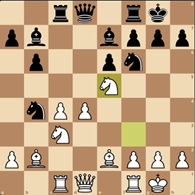
14… Nd7 15. Nxd7 Qxd7 16. d5!?
Black has invested in overprotecting the d5-square, but White is not deterred.
16… Rfd8
Slightly better than, 16… exd5 17. a3 Na6 18. Nxd5 Bxd5 19. cxd5 Rxc1 20. Qxc1.
- a3 Na6
17… Nc6 is also possible, with 18. Re1 (but not 18. dxc6? Qxc6! when a double threat of …Rxd1 and …Qxg2# forces 19. Nd5 exd5 20. Bf3 Qd7) 18… Bf6 19. Bh5 Qe7, and equality.
- Ne4 Nc5 19. Qd4 f6 20. Nxc5 Bxc5 21. Qg4 f5!
Malcolm Pein mentions that, 21… Qe7 22. Rfe1 e5 23. Bd3 is possible. Our engine likes, 21… Qf7 22. dxe6 Qg6 23. Rfd1 Be4 24. Bf3 Qxg4 25. Bxg4, but prefers the text as the best move.
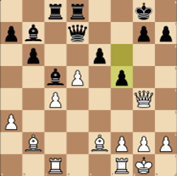
- dxe6?!
This is a weaker response than either, 22. Qg3 or Qf4.
22… Qe7 23. Qxf5
According to Malcolm, also feasible is, 23. Qf4 Qxe6 24. Bf3 Bxf3 25. Qxf3 Qe4 26. Qg3 Rd7, with near-equality. But according to our engine, White can improve on 24. Bf3?! with, 24. Bh5! Bd6 25. Qg5 Qe7 26. Qxf5, which is enough to secure near-equality.
23… Rd2 24. Bd3
With the not inconsiderable threat of 25. Qxh7 Kf8 26. Qh8#.
24… g6!
Malcolm makes the analogy between Black and a calculating machine in even considering the text. And this move looks admittedly flaky, opening the a1-h8 diagonal. But what else?
- a) 24… Rxd3 25. Qxd3 Qxe6 26. Qg3 Qg6 27. Qxg6 hxg6 28. Rcd1 Bc6 29. Rfe1; or,
- b) 24… Be4 25. Bxe4 g6 26. Qe5 Rxb2 27. Qxb2 Bxa3 28. Qd2 Bxc1 29. Rxc1;
Black can not survive either of these variations, so no real calculation is required.
- Qe5??
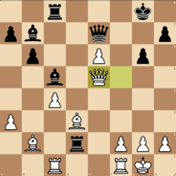
The critical error. After, 25. Qf7+! Qxf7 26. exf7+ Kxf7 27. Bc2 a5 28. Bc3 Re2 29. a4 Rd8, White is only slightly worse and should survive intact. After the text, the game is done.
25… Rxb2 26. Qxb2 Qg5 27. g3 Qg4 28. Qf6 Rf8 29. e7 Rxf6 30. e8=Q+ Rf8 31. Qe2 Bf3 White resigns 0-1
Ray’s 206th book, “ Chess in the Year of the King ”, written in collaboration with Adam Black, and his 207th, “ Napoleon and Goethe: The Touchstone of Genius ” (which discusses their relationship with chess) can be ordered from both Amazon and Blackwells. His 208th, the world record for chess books, written jointly with chess playing artist Barry Martin, Chess through the Looking Glass , is now also available from Amazon.
A Message from TheArticle
We are the only publication that’s committed to covering every angle. We have an important contribution to make, one that’s needed now more than ever, and we need your help to continue publishing throughout these hard economic times. So please, make a donation.





